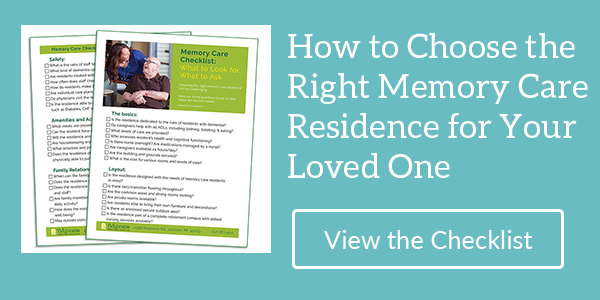A dementia diagnosis is a devastating event in any marriage and one that really changes everything going forward. Suddenly there are so many unknowns, so many new concerns, and so much sadness that the healthy spouse may be overwhelmed. One of the greatest of the unknowns is what dementia senior living options are available and which is best for the couple and the spouse with dementia. To prepare for the future now, take a look at a rundown of dementia senior living options.
Dementia Diagnosis Options
Stay at home
Early on in a dementia diagnosis, many couples agree that home is the safest and most comfortable place to live often just because it is familiar. When one partner is prepared to accept the diagnosis and healthy enough to provide round-the-clock care, home can indeed be a good place to live.
At home dementia patients, in the first stages of the disease are often more at ease because they are accustomed to their surroundings and can retain a level of independence and continue with daily routines with a little help. Living at home also provides the opportunity for family and friends to pitch in with care and companionship so the other partner can take a break with peace of mind. Learn more in the hopkinsmedicine.org article, “Dementia Care: Keeping Loved Ones Safe and Happy at Home.”
As the disease progresses, however, dementia senior living options may include hiring in-home caregivers to assist with everything from personal care to housekeeping to medical care. When it’s time to consider in-home care, find out how to find and pay for the right help in the alz.org article, “In-home Care.”
Move to assisted living
When confronted with the responsibilities of caring for a partner with dementia, many seniors find that moving to assisted living together is an excellent alternative to living at home. In assisted living the healthy partner can continue to provide the care they can, while staff are always on hand to help with tasks like bathing, medication management, and other aspects of living with dementia that have become difficult. Some assisted living communities may also offer activities and therapies specifically for dementia patients, allowing the healthy partner time to pursue their own interests. For more about dementia senior living options in assisted living check out the iadvanceseniorcare.com article, “Assisted Living/Dementia Care: What To Do When Couples Have Different Needs.”
The memory care choices for a dementia diagnosis
The advanced stages of dementia diagnosis bring greater challenges, many of which are not covered in assisted living so memory care is the next step. For example, wandering away from home, delusional or obsessive behavior, and moods associated with anxiety, depression and agitation are often a sign that more specialized care and oversight is needed.
At this time, couples have a variety of choices although some are often more available than others. One common choice among dementia senior living options is for the healthy partner to remain at home while the partner with dementia moves to memory care and is visited by family and friends while specially trained staff are always available.
Similarly, couples living together in a senior living community often have the option of moving one partner to memory care within that community while the other remains in independent or assisted living. This is especially beneficial for both partners because they are still in very close proximity to each other, but the partner with dementia is safe, secure and well cared for 24/7/365.
In some of the most advanced senior living communities, dementia senior living options include allowing healthy partners to live with their partner with dementia in memory care. This is especially common in continuum-of-care communities like Ganton’s Countryside. Our Brightside Assisted Living & Memory Care community offers individual as well as couples apartments with a range of dementia care services provided by certified staff as well as caregiver support services like support groups and complimentary CARES Dementia Program training to preserve and enhance the couple’s quality of life.
Respite care
One more option for couples is respite care which is generally a short-term stay when the caregiving partner needs to take a break. At Ganton’s Countryside respite care is available in our Countryside Care Center and provides fully staffed memory care structured to meet the needs of each resident.
Dementia senior living options can be a lifesaver for couples when one has dementia and the other doesn’t. For more information about Countryside, please call Margaret Nagel at (517) 206-5000 or download our brochure to learn about our care levels, cost, and amenities.


